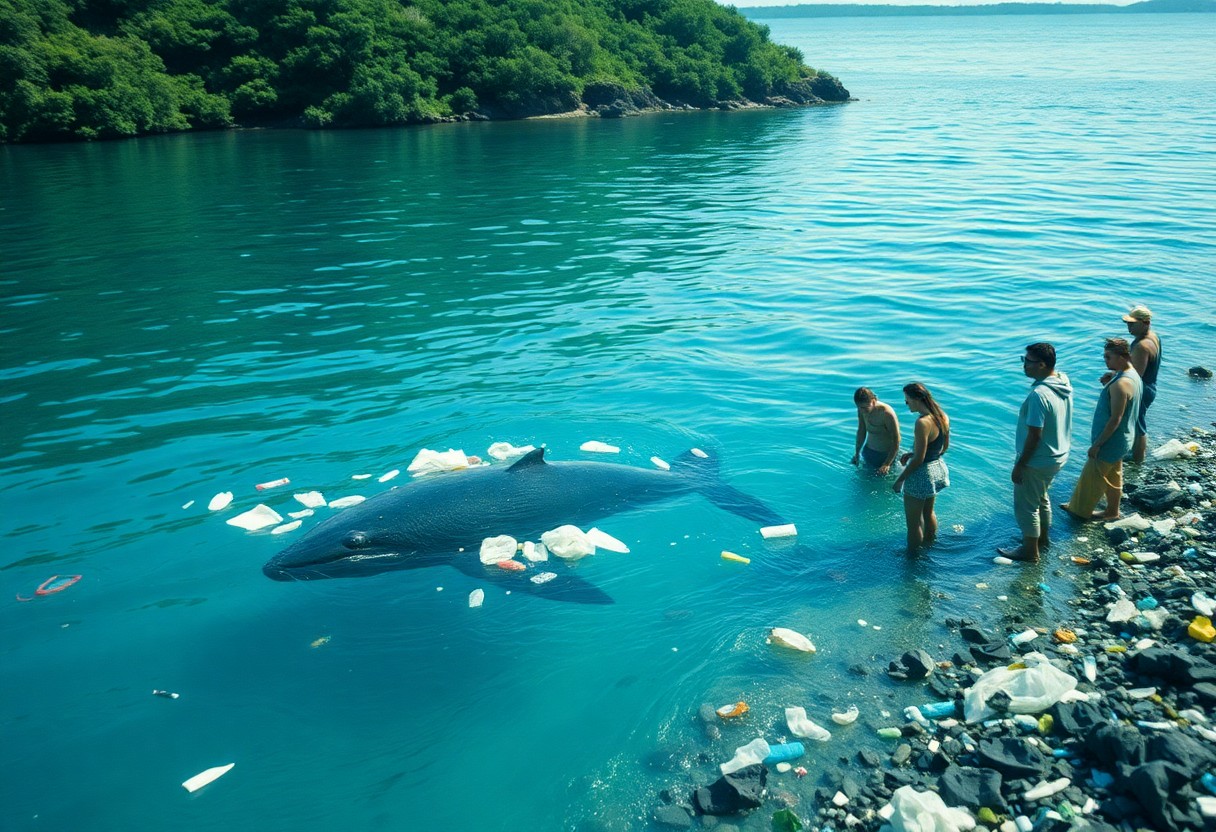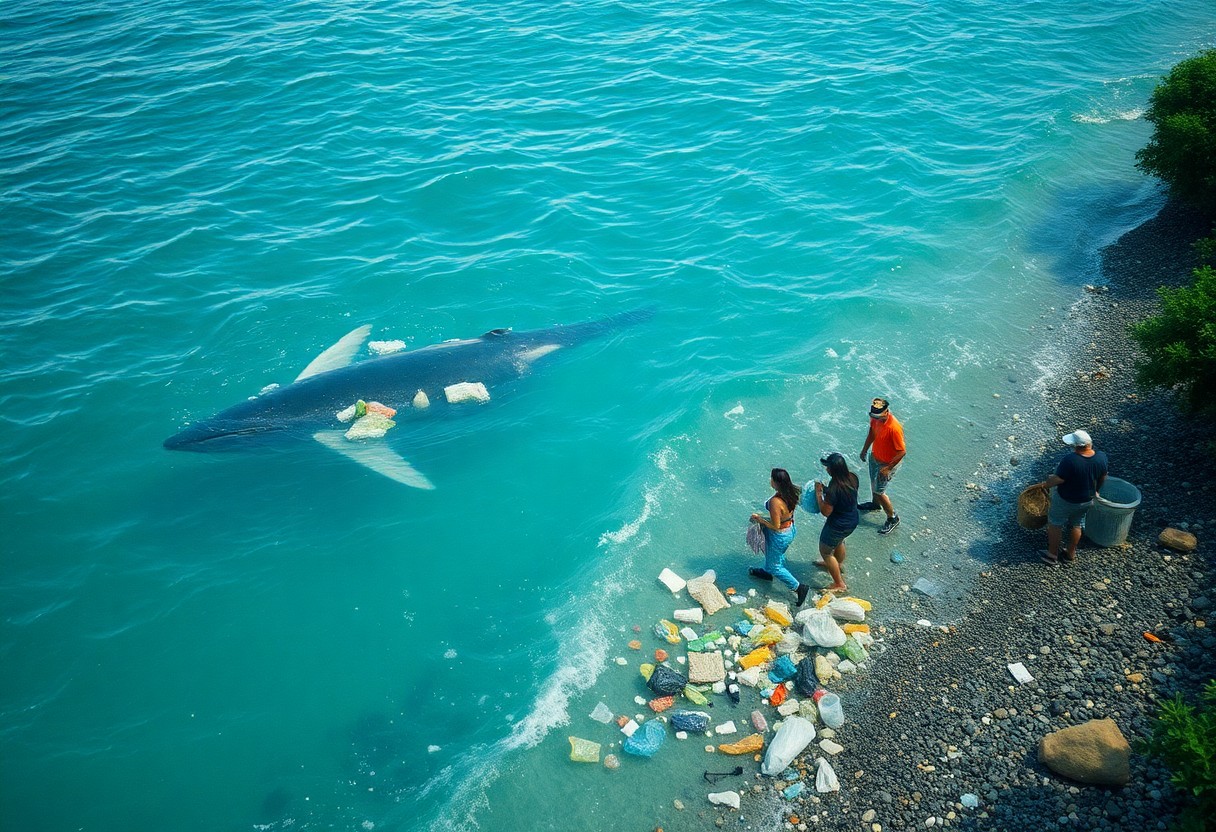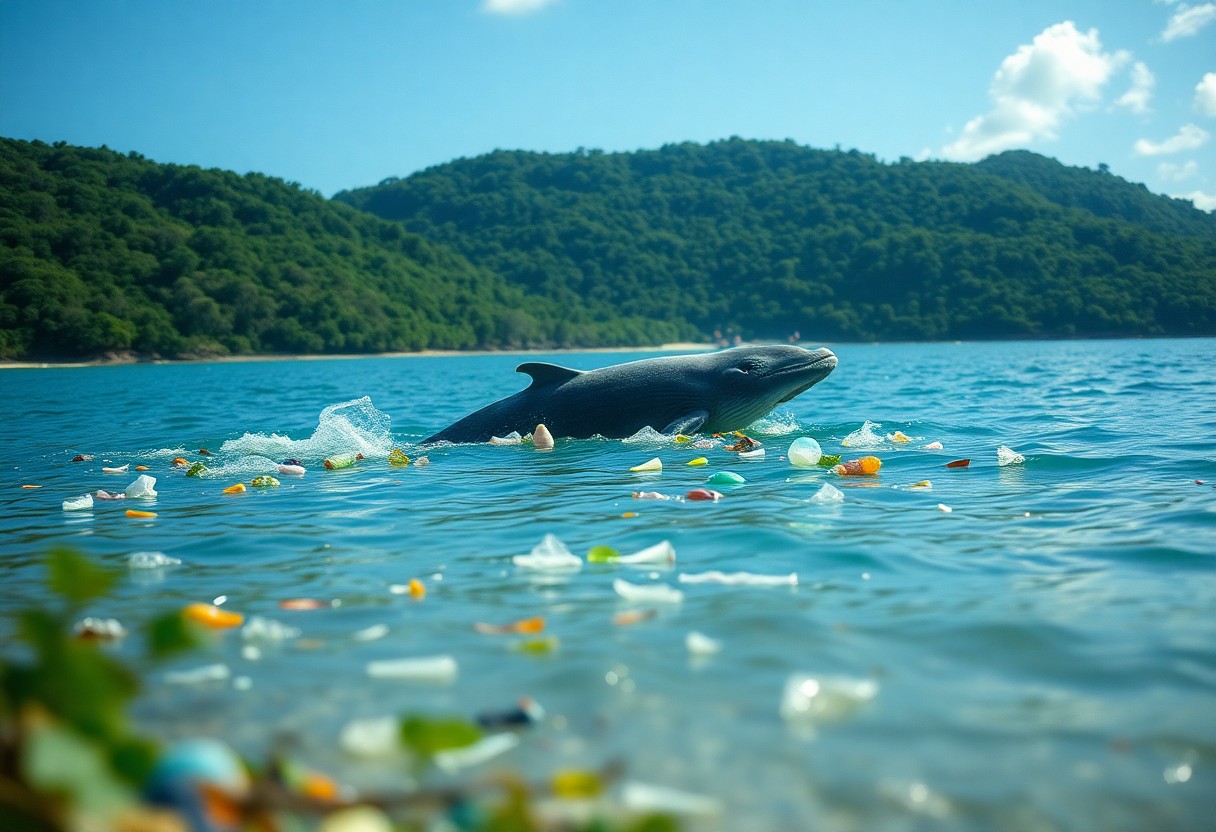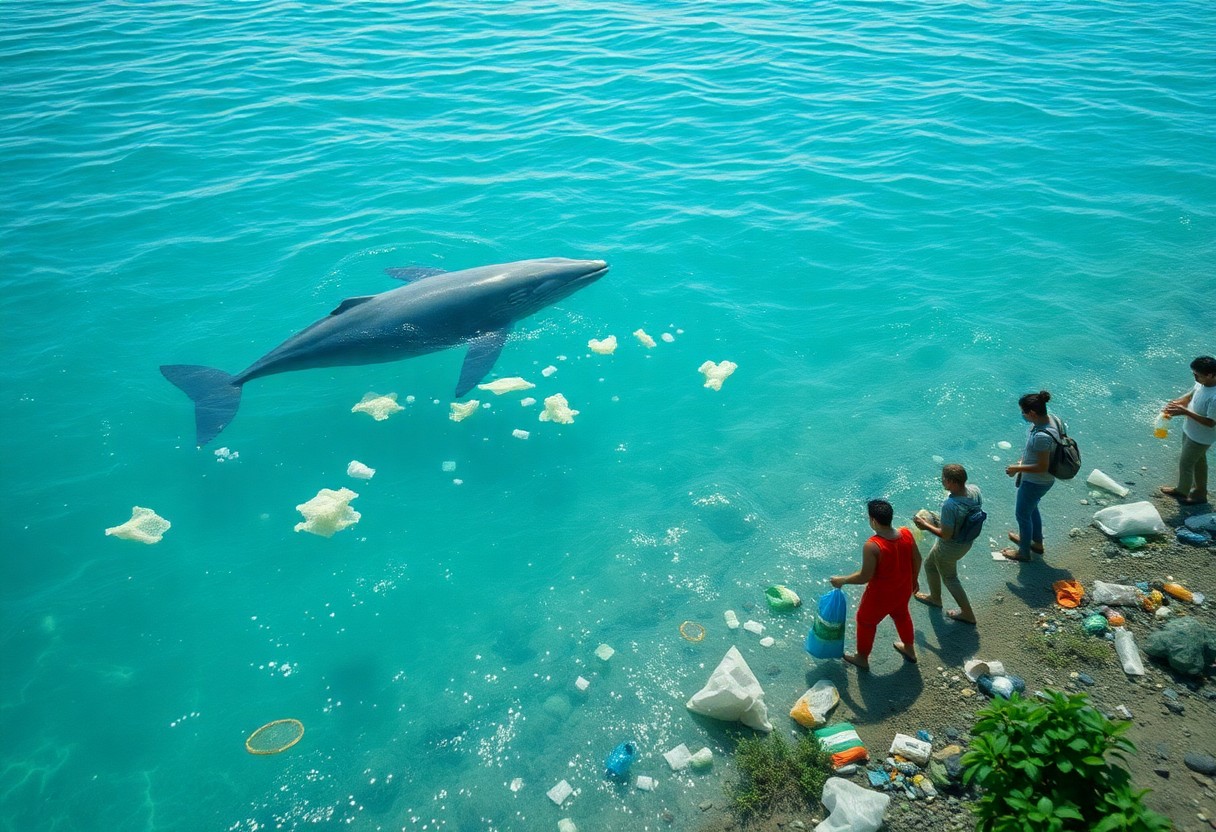Most individuals are increasingly aware of the alarming effects of plastic pollution on marine life, particularly whales. These majestic creatures face numerous threats, from entanglement in debris to ingesting harmful plastics. In this blog post, you will explore effective solutions that you can support or implement to reduce plastic waste and actively contribute to whale conservation efforts. By understanding the challenges and the strategies available, you can play a vital role in protecting both our oceans and these magnificent animals.

Understanding Plastic Pollution
Before delving into solutions, it’s necessary to grasp the enormity of plastic pollution. Every year, millions of tons of plastic waste enter the oceans, impacting ecosystems and marine species, including majestic whales. This pervasive issue stems from our daily habits and consumer choices, necessitating immediate attention for effective change.
Sources of Plastic Waste
With a significant portion of plastic waste originating from single-use products, such as bags, bottles, and packaging, it is imperative that you recognize how your consumption habits can contribute to this environmental crisis. Improper disposal and inadequate recycling systems exacerbate the problem, leading to plastics spreading throughout terrestrial and marine environments.
Impact on Marine Life
Around the world, marine life suffers dramatically due to plastic pollution. Animals ingest plastic debris or become entangled in it, causing injury and even death. Whales, in particular, can ingest large amounts of plastic mistaking it for prey, disrupting their health and reproductive systems.
Marine species, from tiny plankton to massive whales, are increasingly affected by plastic pollution in your oceans. They can mistake plastic debris for food, leading to malnutrition, gastrointestinal blockages, or even starvation. Furthermore, toxic chemicals from plastics accumulate in their bodies, posing risks to their health and disrupting the delicate balance of marine ecosystems. By understanding these impacts, you can advocate for change and adopt practices that help protect our oceans and its inhabitants.

Role of Whale Conservation
While you may not realize it, whale conservation plays a significant role in maintaining the health of our oceans. Protecting these magnificent creatures not only preserves biodiversity but also ensures the stability of marine ecosystems. By learning about effective methods to combat plastic pollution, such as the 10 Ways to Reduce Plastic Pollution, you can contribute to whale conservation efforts in your daily life.
Importance of Whales in Ecosystems
An imperative function of whales in marine ecosystems is their role in nutrient cycling. As they feed and migrate, they distribute nutrients that support the growth of phytoplankton, which in turn produces a significant portion of the Earth’s oxygen. This interconnectedness highlights why protecting whale populations is vital for overall ocean health.
Threats to Whale Populations
For whales, numerous factors threaten their survival, including habitat loss, climate change, and, increasingly, plastic pollution. These threats not only disrupt their feeding and breeding grounds but also jeopardize their health through ingestion and entanglement.
With billions of tons of plastic entering the oceans each year, whales face significant dangers from both direct and indirect exposure. Ingesting microplastics can lead to malnutrition and various health issues, while entanglement in discarded fishing gear can cause injury or death. Climate change exacerbates these threats by altering ocean temperatures and food availability, making it imperative that you stay informed and engaged in conservation efforts to protect these vital marine mammals.
Innovative Solutions to Reduce Plastic Pollution
The increasing awareness of the detrimental effects of plastic pollution has led to innovative solutions aimed at addressing the crisis. Initiatives like ReThink Single-Use Plastics encourage individuals and businesses to minimize their reliance on disposable plastics, promoting reusable alternatives that can significantly lessen the amount of waste entering our oceans. By adopting these practices, you not only contribute to a cleaner environment but also support the fight against plastic pollution that threatens marine life, including whales.
Policy Changes and Regulations
Against the backdrop of plastic pollution, you may find that governments are increasingly implementing policies and regulations to curb plastic use. These measures, such as bans on single-use plastics and incentives for eco-friendly packaging, aim to foster a sustainable approach to consumption. By advocating for and supporting these initiatives, you can play a part in shaping policies that protect our oceans and wildlife.
Community Engagement and Education
Reduce your impact by participating in community initiatives that focus on reducing plastic waste. Engaging in local clean-up events or educational programs fosters a collective responsibility towards protecting the environment. By connecting with like-minded individuals in your community, you contribute to larger efforts to combat plastic pollution.
Education is an necessary part of empowering you and your community to act against plastic waste. Through programs that raise awareness about the effects of plastic pollution on marine life, such as whales, you gain a deeper understanding of how your choices impact the environment. By sharing this knowledge and encouraging discussions, you can inspire others to adopt sustainable practices, creating a ripple effect that leads to positive change in your community.

Technological Advances in Waste Management
For many communities, embracing innovative waste management technologies can significantly reduce plastic pollution. Solutions such as automated sorting systems and AI-driven recycling centers enhance material recovery efficiency. By implementing these technologies, you can contribute to cleaner oceans and protect marine life. To learn how you can help combat ocean pollution – Whale & Dolphin Conservation USA, consider supporting local initiatives focused on waste management upgrades.
Recycling Innovations
Against traditional methods, recycling innovations focus on improving the efficiency of material recovery. Advanced processes like chemical recycling allow for a broader range of plastics to be processed, which increases recycling rates and reduces waste. By advocating for these modern solutions, you help shape a more sustainable future.
Biodegradable Alternatives
Between conventional plastics and eco-friendly options, biodegradable alternatives offer hope in reducing waste. These materials break down more quickly in natural environments, minimizing their impact on marine ecosystems. By choosing biodegradable products, you can play a role in preserving ocean health.
Also, there is a growing range of biodegradable materials available, such as plant-based plastics and compostable packaging. These alternatives are designed to degrade over time, which means they won’t linger in landfills or oceans. You can actively seek out products made from these materials, encouraging manufacturers to adopt sustainable practices while contributing to positive change in reducing plastic pollution.
Global Initiatives and Partnerships
Many organizations and governments around the world are coming together to address plastic pollution and its impacts on whale conservation. Collaborative efforts include partnerships aimed at reducing plastic waste, promoting sustainable fishing practices, and protecting marine habitats. By uniting resources and expertise, these global initiatives enhance awareness and drive policy changes that are important for preserving the oceans and the incredible species that inhabit them.
International Treaties and Agreements
Against the backdrop of increasing plastic pollution, various international treaties and agreements have been established to protect marine ecosystems. These legal frameworks aim to reduce plastic waste entering the oceans, regulate plastic production, and enforce conservation measures tailored to safeguard whale species and their habitats. By participating in these agreements, countries commit to coordinated action, making strides toward a healthier ocean environment.
Collaborative Conservation Efforts
Initiatives that involve multiple stakeholders, including governments, NGOs, and local communities, play a significant role in whale conservation. These collaborative efforts tackle not only plastic pollution but also broader issues affecting marine life, such as habitat destruction and climate change. You can support these programs by participating in local clean-ups, advocating for responsible waste management policies, and contributing to conservation organizations. United efforts are important for creating long-lasting change that positively impacts marine ecosystems.
To effectively tackle plastic pollution and bolster whale conservation, it is important to engage in collaborative conservation efforts that leverage the strengths of various stakeholders. These programs may include beach clean-ups, recycling initiatives, and educational campaigns that inform you about sustainability. In addition, partnerships with scientists can enhance research on whale populations and their habitats, helping to inform policy changes that benefit marine ecosystems. Your involvement can bring about significant positive change, as collective action amplifies impact and fosters a culture of stewardship for our oceans.
Case Studies of Successful Interventions
Not all interventions to combat plastic pollution are created equal, with several standout cases offering inspiration. Here are some notable examples:
- The Ocean Cleanup project has removed over 100,000 pounds of plastic from the Great Pacific Garbage Patch.
- In 2019, the city of San Francisco achieved a 80% waste diversion rate through strict recycling and composting policies.
- Plastic Bank has partnered with communities in countries like Indonesia, collecting more than 50 million plastic bottles since its inception.
- Whale conservation efforts in British Columbia have led to a 30% reduction in ship strikes through new regulations on shipping lanes.
Local and Global Success Stories
Among the various initiatives undertaken worldwide, local and global success stories stand out as beacons of hope. Programs that focus on community engagement have thrived, such as beach clean-up events in Hawaii, which have resulted in the removal of 23 tons of debris. Globally, bans on single-use plastics in countries like Kenya have curtailed plastic consumption, showcasing effective legislation at work.
Lessons Learned for Future Actions
Before initiateing on future plastic reduction strategies, it is vital to analyze what has been done effectively in previous campaigns. Acknowledging collaborative approaches, as seen in the partnership between NGOs and local businesses, demonstrates that multifaceted efforts yield the best outcomes. Engaging communities through education improves support and participation, and data-driven strategies allow for targeted interventions to maximize effectiveness.
Interventions like these underline the necessity for ongoing assessments and adjustments. You should consider that each case offers valuable insights into what works and what does not. Adopting flexible measures while learning from past successes creates a framework for more innovative approaches. This continuous improvement can significantly minimize plastic pollution, leading to enhanced whale conservation and healthier oceans.
Summing up
Ultimately, you can contribute to combating plastic pollution and protecting whale conservation by supporting legislation aimed at reducing plastic production, participating in local clean-up efforts, and making sustainable consumer choices, such as opting for reusable products. Educating yourself and others about the impacts of plastic waste on marine life, including whales, further empowers you to take action. Additionally, consider supporting organizations that focus on ocean health and wildlife conservation. Collectively, these steps not only help safeguard whales but also ensure a healthier marine environment for future generations.



